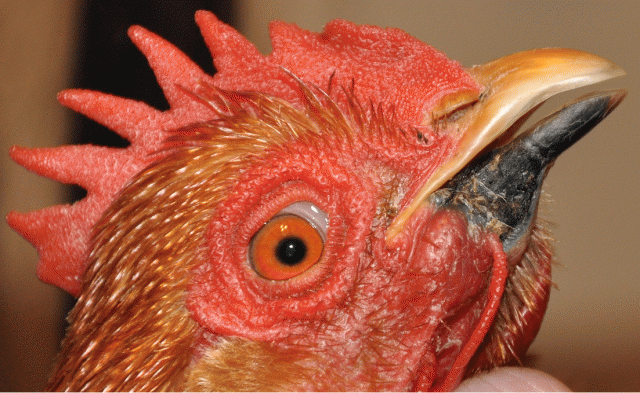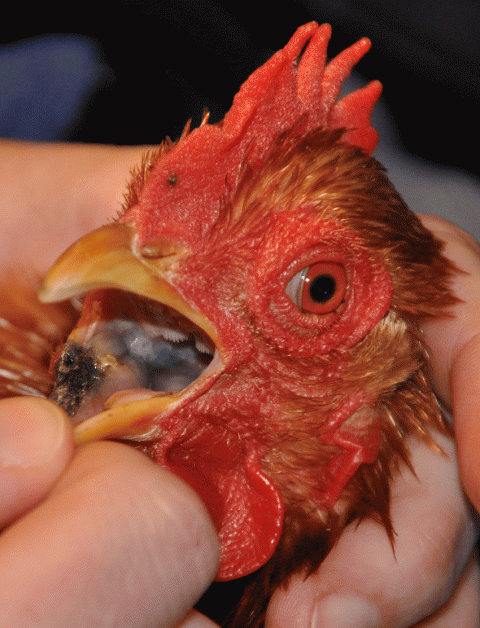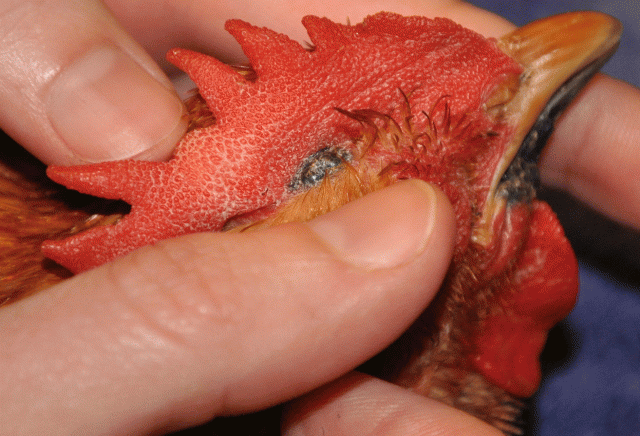1) What type of bird , age and weight.
Bantam cochin hen, about three years. I have no idea what her weight is, but she feels normal.
2) What is the behavior, exactly.
There is absolutely nothing wrong with her behavior. She eats and drinks normally, her feathers look normal, and she acts like she always has . . . like the bossy little hen at the top of the pecking order. I believe it's because she's acting so healthy and normal that I missed this. One side of her beak is pretty swollen, and the bottom beak has turned black. She had a black lump on the outside of her lower beak, about half the size of a marble and hard to the touch, but after gently rubbing it with a wet towel for less than ten seconds the black lump came clean off. There was extremely light bleeding where the lump came off. There's also a small black spot at the top of her head, but I don't know if the two are related.
3) How long has the bird been exhibiting symptoms?
I have no idea, but I have a feeling it must have been present for quite a while before I noticed it. I only became aware of it a few days ago.
4) Are other birds exhibiting the same symptoms?
Not at all.
5) Is there any bleeding, injury, broken bones or other sign of trauma.
Just the light bleeding resulting from the black lump coming off.
6) What happened, if anything that you know of, that may have caused the situation.
No clue.
7) What has the bird been eating and drinking, if at all.
Their normal pellets, occasional treats of sweet potatoes, pumpkin, lettuce, and sunflower seeds.
8) How does the poop look? Normal? Bloody? Runny? etc.
Normal. Nothing wrong there.
9) What has been the treatment you have administered so far?
I've been keeping the black areas clean and I rubbed neosporin on the area that bled.
10 ) What is your intent as far as treatment? For example, do you want to treat completely yourself, or do you need help in stabilizing the bird til you can get to a vet?
Since she doesn't seem bothered at all by this (yet?), I don't feel there's a sense of urgency. Mostly I want opinions on what exactly is going on with her, so I can better judge what course of action to take.
11) If you have a picture of the wound or condition, please post it. It may help.
Poor thing got some pumpkin seeds and steamed squash for being such a good girl while I posed her for pictures . . .



12) Describe the housing/bedding in use
She sleeps on a 2x4 perch in a 4x8 tractor type coop with aspen shavings. Days are spent roaming over half an acre that's pretty barren right now due to it being winter.
Bantam cochin hen, about three years. I have no idea what her weight is, but she feels normal.
2) What is the behavior, exactly.
There is absolutely nothing wrong with her behavior. She eats and drinks normally, her feathers look normal, and she acts like she always has . . . like the bossy little hen at the top of the pecking order. I believe it's because she's acting so healthy and normal that I missed this. One side of her beak is pretty swollen, and the bottom beak has turned black. She had a black lump on the outside of her lower beak, about half the size of a marble and hard to the touch, but after gently rubbing it with a wet towel for less than ten seconds the black lump came clean off. There was extremely light bleeding where the lump came off. There's also a small black spot at the top of her head, but I don't know if the two are related.
3) How long has the bird been exhibiting symptoms?
I have no idea, but I have a feeling it must have been present for quite a while before I noticed it. I only became aware of it a few days ago.
4) Are other birds exhibiting the same symptoms?
Not at all.
5) Is there any bleeding, injury, broken bones or other sign of trauma.
Just the light bleeding resulting from the black lump coming off.
6) What happened, if anything that you know of, that may have caused the situation.
No clue.
7) What has the bird been eating and drinking, if at all.
Their normal pellets, occasional treats of sweet potatoes, pumpkin, lettuce, and sunflower seeds.
8) How does the poop look? Normal? Bloody? Runny? etc.
Normal. Nothing wrong there.
9) What has been the treatment you have administered so far?
I've been keeping the black areas clean and I rubbed neosporin on the area that bled.
10 ) What is your intent as far as treatment? For example, do you want to treat completely yourself, or do you need help in stabilizing the bird til you can get to a vet?
Since she doesn't seem bothered at all by this (yet?), I don't feel there's a sense of urgency. Mostly I want opinions on what exactly is going on with her, so I can better judge what course of action to take.
11) If you have a picture of the wound or condition, please post it. It may help.
Poor thing got some pumpkin seeds and steamed squash for being such a good girl while I posed her for pictures . . .



12) Describe the housing/bedding in use
She sleeps on a 2x4 perch in a 4x8 tractor type coop with aspen shavings. Days are spent roaming over half an acre that's pretty barren right now due to it being winter.
Last edited:

